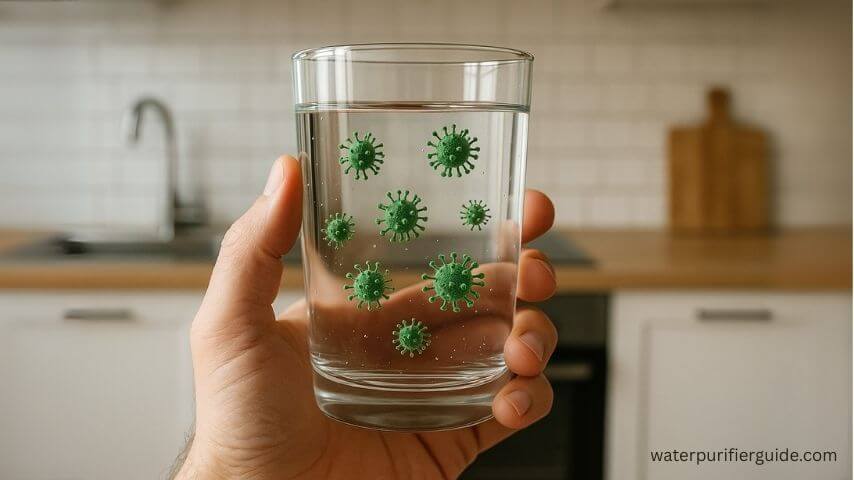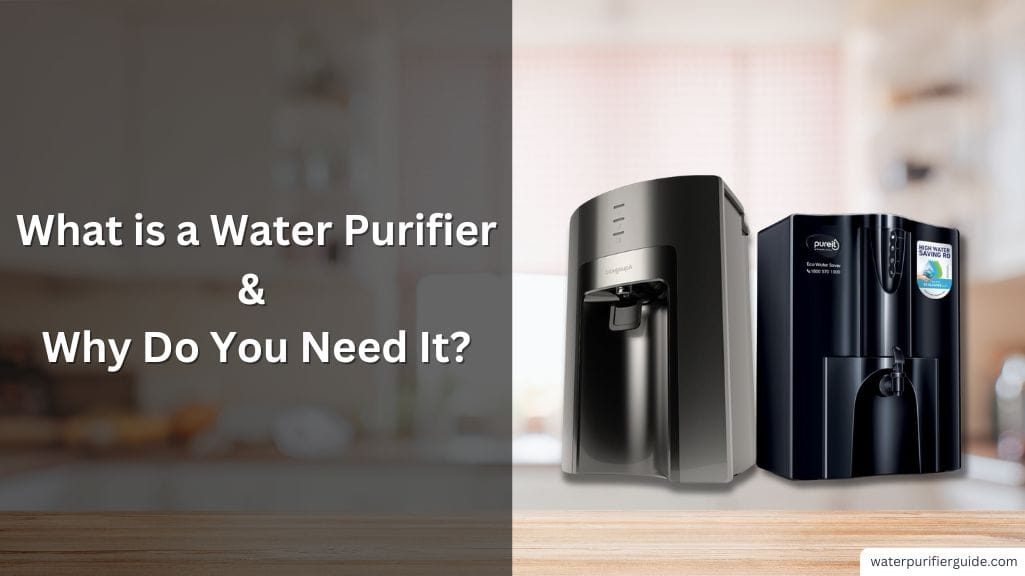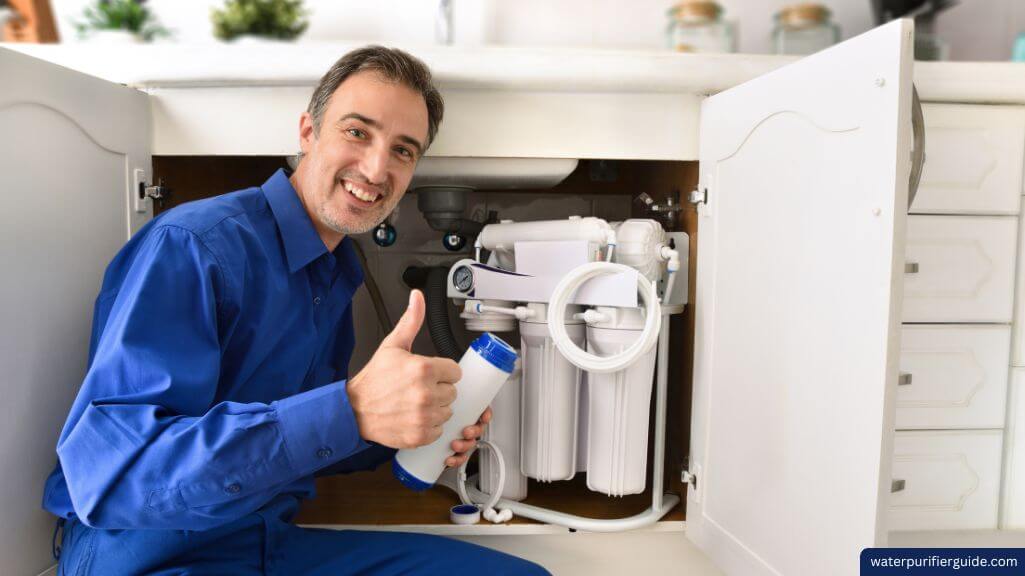Drinking pure water has become the biggest need of today’s time. Even if the tap water in your house looks clean, many harmful bacteria and viruses may be hidden in it. In such a situation, UV Water Purifier comes out as a great solution.
UV means Ultraviolet i.e. ultraviolet rays. This purifier works to kill the microorganisms present in the water, making the water drinkable. No chemicals are added to it and the taste of the water also remains the same.
If the water in your area has low TDS i.e. it does not contain much salt or mud, then UV Water Purifier can be a great option for you. This is especially true for those who live in cities and where the water supply is relatively clean.
Further in this article, you will know how UV water purifier works, what are its benefits, and whether it is really the right choice for your home.
What is UV Water Purifier?
UV stands for Ultraviolet. It is a light that is not visible to our eyes, but its power is so high that it can kill bacteria and viruses present in water.
When water passes through a UV purifier, it comes in contact with UV light. These ultraviolet rays destroy the DNA of bacteria and viruses, making them instantly inactive and incapable of spreading disease. This process is completely chemical-free and there is no change in taste or odor.
UV Water Purifier is mostly used in places where the water is clean in appearance, but there is the presence of microorganisms in it. Such water is called microbiologically unsafe. This means that there is no dirt in the water, but there may be bacteria or viruses.
You have often seen UV purifiers in homes, schools, hospitals and small commercial places. They are suitable for places where the water just needs to be freed from bacteria and viruses, and not to remove sludge, heavy metals or dissolved substances from it.
Important Points to Remember:
- The main function of UV Water Purifier is to eliminate bacteria and viruses present in the water.
- It is only effective if the water is already clean, but not microbiologically safe.
- UV technology makes water safe fast, without chemicals and without changing the taste.
- By using it in homes and small institutions, you can easily get clean and healthy water.
How Does UV Water Purifier Work?
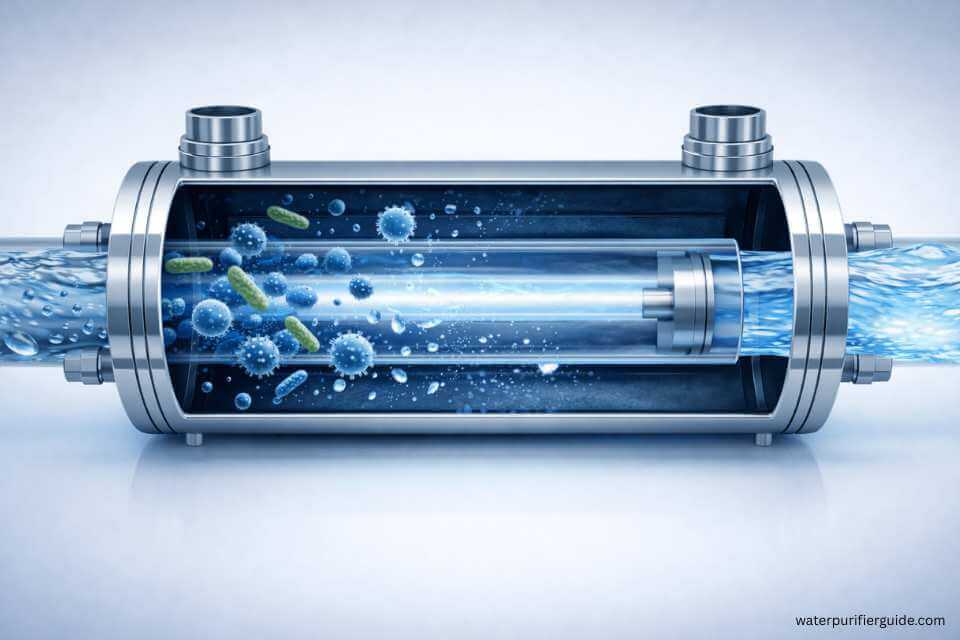
When you use a UV Water Purifier, there is a precise and scientific process behind it, which makes the water drinkable. It is important to understand this process so that you can know whether this technology is right for you or not.
First of all, let’s talk about the Components of a UV system — that is, the main parts that make this technology work:
- UV Lamp: This is a special type of tube that produces ultraviolet rays (UV-C rays).
- Quartz Sleeve: This is a transparent cover that separates the UV lamp from the water but allows the rays to pass through.
- UV Chamber: This is the part where the water passes through and comes in contact with the UV light.
- Power Supply: The electric unit required to run the entire system.
Now let’s know how this process works:
When water enters the UV system, it first goes through pre-filtration. This step is necessary because if there is soil, mud or dirt in the water, they can block the UV light. The pre-filter removes these solid particles, making the purification process effective.
The water then reaches the UV chamber where it comes in contact with UV light. The power of this light is so much that it kills bacteria, viruses and other disease-causing microorganisms present in the water — that too without changing any chemical or taste.
If you are wondering how to differentiate it from boiling or chemical disinfection, then understand:
- Boiling consumes more time and gas.
- Chemical disinfection (such as chlorine) can affect the taste and can also have a bad effect on the body.
- But UV technology is fast, without any change in taste, and completely safe.
Key Takeaways:
- The main parts of a UV water purifier include a UV lamp, quartz sleeve, chamber and power unit.
- This technology destroys microorganisms by exposing water to UV rays.
- Pre-filtration is necessary so that the UV light works properly.
- UV disinfection is a better, faster and safer option than boiling and chemicals.
Benefits of UV Water Purifier:
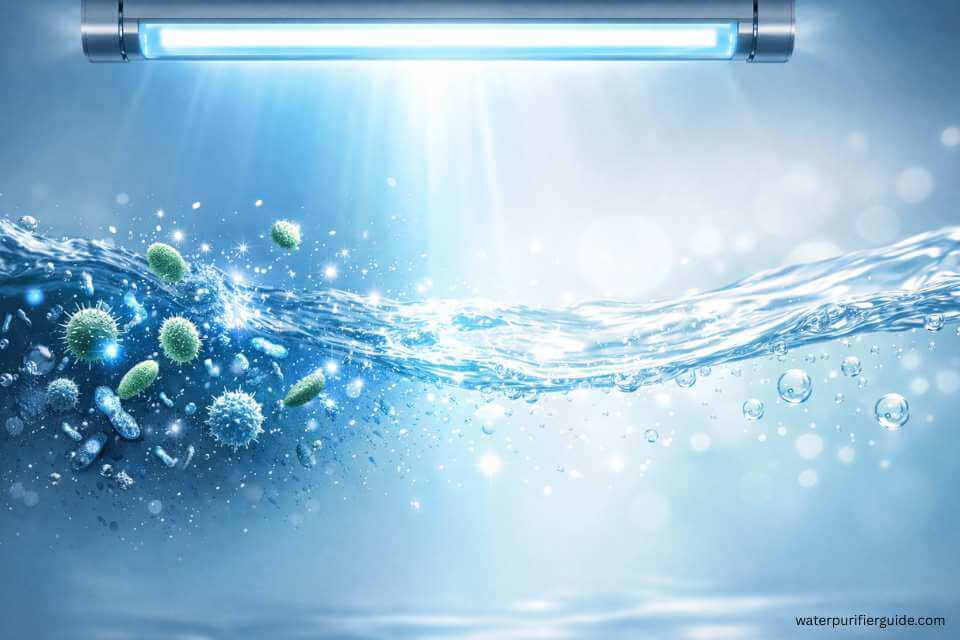
If you are looking for a water purifier that cleans your drinking water quickly and safely, then UV technology can be a great option for you.
Let’s know the Benefits of UV Water Purifier:
1. Kills 99.99% Bacteria, Viruses and Protozoa
The most special thing about UV water purifier is that it kills almost 99.99% of microorganisms like harmful bacteria, virus and protozoa present in the water. These are the same bacteria that cause diseases like diarrhea, typhoid and cholera.
2. No Chemicals Used – Safe and Eco-Friendly
UV technology is completely chemical-free. It does not add any chlorine or change the taste or colour of the water. This method is not only better for your health but is also safe for the environment.
3. Low Maintenance and Energy-Efficient
UV Water Purifiers do not have any complex filters or heavy machinery. Its maintenance is very easy and the power consumption is also very low.
4. Retains the Natural Taste and Minerals of Water
Since UV technology only kills microorganisms, it retains the essential minerals and its natural taste present in the water.
5. Fast Purification Process
The process of UV purifiers is very fast. The moment the water passes through the UV chamber, it gets purified at the same time.
Essential Insights:
- UV purifier purifies water quickly and safely without any chemicals.
- It kills bacteria and viruses but retains the nutrients in the water.
- If you want a low maintenance, eco-friendly and healthy solution, then UV water purifier is a great option for you.
Limitations of UV Water Purifier
Although UV water purifier is an excellent option in many cases, it is not necessarily sufficient alone in every situation. It also has some limited uses, which you must understand before buying.
Let’s take a look at its Limitations:
1. Does not remove dissolved solids (TDS), heavy metals and turbidity
The job of UV technology is only to kill bacteria and viruses. It cannot remove TDS (Total Dissolved Solids), such as salt, chemicals or heavy metals (such as lead, arsenic) from water. If the TDS in water in your area is high, then UV alone will not work.
2. UV does not work if the water is dirty or muddy
If there is mud, sand or turbidity in the water, then the UV light is not able to reach inside the water properly. In such a situation, bacteria can survive and disinfection remains incomplete. In such a situation, pre-filtration or other technology is needed along with UV.
3. Runs on electricity
UV purifiers require constant electricity to run. If there is frequent power outage in your place, then this system will not prove to be as reliable.
4. It is necessary to change the UV Lamp from time to time
The UV Lamp has a limited life. Every 12 months or even earlier, its lighting capacity can decrease. Therefore, it is necessary to change the lamp from time to time, which demands an additional expense and attention.
Don’t Overlook This:
- UV is good only for removing bacteria and viruses, but not for TDS and chemicals.
- UV technology is not effective in turbid or muddy water.
- Constant power and frequent lamp replacement make it a limitation.
- Make sure to check your water quality before buying — then make the right decision.
Conclusion:
Now that you have a better understanding of UV technology, let’s take a closer look at it. The main purpose of a UV Water Purifier is to eliminate bacteria, viruses and harmful microorganisms from water — without using any chemicals and without altering the taste of the water. This method is fast, safe and low maintenance.
If the water in your area is clean in appearance but has a microbiological risk — like borewell or tank water — then a UV Water Purifier could be the perfect and cost-effective solution for you.
However, if the water contains TDS, heavy metals, or impurities, UV technology alone will not be enough. In such a situation, you can consider combination systems like RO+UV or UF+UV, which purify water at every stage.
FAQs: Frequently Asked Questions
Q1. What is UV Water Purifier?
UV Water Purifier is a device that makes water safe by killing bacteria and viruses present in the water with the help of ultraviolet rays.
Q2. Does UV purifier completely remove germs from water?
Yes, UV technology inactivates up to 99.99% of bacteria and viruses, but it does not remove TDS or impurities from water.
Q3. Are any chemicals added to UV Water Purifier?
No, it is a completely chemical-free process that works only with UV light, retaining the taste and minerals of water.
Q4. Are UV purifiers suitable for all types of water?
No, UV alone is not enough if the water has TDS, sludge or heavy metals. In such a case, RO+UV or UF+UV systems are better.
Q5. Is electricity required to run UV purifiers?
Yes, UV purifiers require electricity to run as UV light is generated only when the system is connected to power.
📌 Sources & References
The information in this article is based on publicly available data from trusted government bodies, health organizations, and water research institutions to ensure accuracy and relevance for Indian households.
- U.S. Environmental Protection Agency (EPA) – UV Disinfection Guidance Manual
[Supports technical explanations of UV disinfection efficacy, dosage requirements, and real-world drinking water applications.] - Ultraviolet Germicidal Irradiation – Scientific Overview
[Explains how UV-C light disables microorganisms and clarifies that UV does not remove dissolved impurities from water.] - National Library of Medicine (PMC) – UV-C Irradiation & Bacterial Disinfection
[Provides peer-reviewed scientific evidence on the effectiveness of UV-C light against harmful waterborne bacteria.] - WHO – Guide to Promotion of Drinking-Water Disinfection
[Supports discussion on household water disinfection methods and when UV treatment is appropriate.] - Research Review – Overview of Water Disinfection by UV Technology
[Offers an academic review of UV disinfection mechanisms, microbial inactivation, and system limitations.] - UK Drinking Water Inspectorate – UV System Guidance
[Supports regulatory insights into UV system design, operation, and compliance for drinking water safety.]

